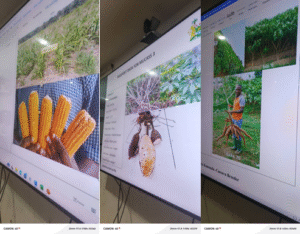The Executive Director of the Sierra Leone Seed Certification Agency (SLeSCA), Dr Robert Chakanda, has confirmed that his agency, through the recommendation of the Variety Release and Registration Committee, will release 33 varieties or candidates of seed from rice, cassava and maize to farmers in Sierra Leone and West Africa. He was speaking at a presentation of research work by seed breeders in the three categories at the SLeSCA conference hall on Wednesday 11th September 2025, where technical sessions on policy and regulation matters were reviewed by experts in the sector.


The more than ten-year research work was successfully carried out by Sierra Leonean scientific researchers and seed breeders at the Sierra Leone Agricultural Research Institute (SLARI).
The Executive Director said three categories were prioritised for the research work, including rice, cassava, and maize, pointing out that, out of the 33 candidates of seed, 19 were from other West African countries, while 14 were varieties identified by Sierra Leonean breeders.
The Executive Director revealed that his agency, which has been responsible for the certification of seed in the country, has been working with SLARI and seed breeders nationwide to embark on scientific research to determine various varieties of seed that will produce high yields for farmers to boast about in the government flagship programme, Feed Salone. He said that upon successful completion of the research work by our agricultural scientists, his agency organised an experts’ evaluation exercise to determine which of the sets of candidates will be recommended for approval and released to farmers.

The team lead for rice breeders, Dr Nabieu Kamara, said that over the years the Rokupr Rice Research Centre has been releasing varieties of rice that have stood the test of time, adding, however, that in the past four years, they have embarked on research activities on 16 varieties of rice that they have tested nationwide, while farmers were invited to have a field day to select the best varieties, which were already tested across their fields with good grades.
Dr Janatu Veronica Sesay, the technical head of SLeSCA, said experts from different disciplines in the agriculture sector were invited by the agency to listen to their expert opinion on the presentation from the breeders on their seed. She said the experts were to assess the different methods of breeding used, their selection of seed depending on the crops, comparative advantage, breeding area, yield capacity, and trade quantity control, among others.
On behalf of Cassava Breeders, Raymond Massaquoi, the Research Officer at SLARI, said that since 2015/16, they had started breeding research on nine varieties of cassava, using both mutational and conventional methods, adding that they were able to complete identification of the doses, selection, stabilisation, and multiplication trial, all of which were to determine its adaptability in all agroecological zones nationwide, along with reception from farmers with regard to how they appreciate the varieties.
The Research Officer furthered that if their candidates prove to be adoptable, they are of the view that they did not only have something for the farmers, but rather, it will be a dream come true, especially for the breeders, the country and Feed Salone, adding that it will mean that they will be motivated to embark on more research.
However, if the seed approval committee recommends that the present set of candidates be either registered or released to farmers in Sierra Leone and West Africa, it will mean that for rice, a total of 13 seeds will be imported from other West African countries, and three will be Sierra Leonean seeds. Cassava will have 9 new varieties, including six from West Africa and three from Sierra Leone, while for maize, Sierra Leonean and West African farmers will welcome eight new varieties that have been discovered by Sierra Leonean agricultural scientists.